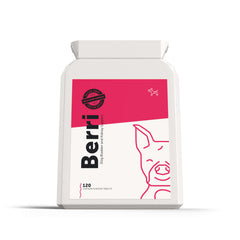Your basket is empty

Navigating Urinary Tract Infections in Dogs
June 30, 2023 7 min read
Urinary tract infections (UTIs) are common in dogs, causing discomfort and posing serious health risks if left untreated. Understanding these infections' causes, symptoms, and treatments is crucial for any pet parent who wants to ensure their furry friend leads a healthy, happy life. This article will delve into UTIs in dogs and explore the various natural remedies available to help manage and prevent this prevalent health issue.
Understanding UTIs in Dogs
A urinary tract infection in dogs is typically caused by bacteria that enter the urethra and ascend into the bladder, leading to inflammation and infection. It's important to know that while dogs of any age, breed, or gender can suffer from UTIs, some are more prone than others. For instance, female dogs, older dogs, and dogs with other medical conditions, such as diabetes or kidney disease, may be more susceptible to UTIs.
When a dog suffers from a UTI, they may exhibit various symptoms. Some common signs include frequent urination, difficulty urinating, bloody or cloudy urine, fever, lethargy, and discomfort or pain. Dogs may also lick the genital area more than usual. In more severe cases, lack of appetite, vomiting, and weight loss may also be seen. As pet parents, paying close attention to any changes in your dog's behaviour or overall health is essential and consult with a vet if you notice any of these symptoms.
While UTIs can be uncomfortable and distressing for your pet, they can also lead to more severe health problems if left untreated. Infections can ascend into the kidneys, causing kidney infections (pyelonephritis) that can be life-threatening. Chronic UTIs can lead to bladder stones or other complications. Therefore, prompt diagnosis and treatment are of utmost importance.
***
Diagnosing UTIs in Dogs

Diagnosing a UTI in dogs typically involves a veterinarian conducting a physical examination and ordering a urinalysis. The physical exam may reveal tenderness in the bladder area. At the same time, the urinalysis can help identify white blood cells, red blood cells, or bacteria pointing towards a UTI. Sometimes, a urine culture may be ordered to determine the specific bacteria causing the infection. This can help guide the treatment plan. Other diagnostic tests, such as blood tests or imaging studies like X-rays or ultrasound, may be necessary, especially if the vet suspects a more serious underlying condition or complication.
***
Conventional Treatment of UTIs in Dogs
The cornerstone of treating UTIs in dogs is typically antibiotics (most commonly penicillin or fluoroquinolone). Once a vet identifies a UTI, they'll prescribe a course of antibiotics suitable to eliminate the specific type of bacteria causing the infection. The course's length may vary, often between 10 to 14 days, but it's crucial to complete it even if your dog seems to be feeling better before the course is finished. Discontinuing antibiotics prematurely may allow the infection to return or promote antibiotic resistance.
While antibiotics are necessary to treat the condition, they may also cause side effects, such as upset stomach, loss of appetite, and diarrhoea. If your dog experiences these, do reach out to your vet; they may be able to recommend ways to manage these symptoms or prescribe a different antibiotic.
It's important to remember that while antibiotics are often necessary for treating UTIs, they won't necessarily prevent a future recurrence. For that, you'll want to consider preventive measures, including lifestyle changes and natural remedies.
***
Natural Remedies for UTIs in Dogs
When it comes to supporting your dog's urinary health and preventing UTIs, natural remedies can play a significant role. These remedies work best as preventive measures or alongside antibiotics rather than as replacements for conventional medical treatment.
One of the key natural remedies is ensuring your dog stays well hydrated. The more your dog drinks, the more often they'll urinate, which helps flush out bacteria from the urinary tract. Encouraging your dog to drink can be as simple as always ensuring fresh water is available, or you could add a little low-sodium broth (check out our dehydrated bone broth Brothy) to their water to make it more appealing.
Certain foods can also support urinary health. For instance, cranberries are known for reducing the adherence of bacteria to the urinary tract walls, making it harder for an infection to take hold. Adding a bit of cranberry juice (ensure it's unsweetened and not a cranberry juice cocktail) to your dog's food can provide this benefit.
However, it's crucial to note that while natural remedies can help maintain urinary health and reduce the risk of UTIs, they cannot replace veterinary care. If your dog is showing symptoms of a UTI, it's vital to consult your vet promptly.
***
The Role of Supplements in Canine UTIs
Supplements can play a pivotal role in supporting your dog's urinary health. Specific natural ingredients can aid in preventing UTIs, reducing the severity of symptoms if a UTI occurs, and even helping speed up recovery. Our Berri Bladder & Kidney Supplement is one such product. It is formulated with a unique blend of ingredients, each known for their urinary health benefits.
Berri contains D-Mannose, a type of sugar that helps prevent harmful bacteria from sticking to the walls of the urinary tract, reducing the chance of infection. It also includes cranberry extract, which is known for similar benefits. Alongside these, it has nettle seed, which is often used to support kidney health and can assist with water metabolism in the body. The supplement also includes astragalus root, long used in traditional medicine for its immune-boosting and anti-inflammatory properties. It is thought to help the body fight off infections more effectively. Marshmallow root is also present in the mix - a botanical known for its soothing properties, potentially helping to alleviate the discomfort associated with UTIs.
However, like all supplements, Berri is not a cure for UTIs. It's designed to support urinary health and reduce the likelihood of UTIs but is not a substitute for veterinary care. If your dog develops a UTI, they should be seen by a vet and may need antibiotics to clear the infection.
***
Preventative Measures for UTIs in Dogs
Prevention is always better than cure. While you may be unable to eliminate the risk of your dog developing a UTI completely, certain measures can significantly reduce the chances.

1. Hydration: Keep your dog well-hydrated. Provide plenty of clean, fresh water and encourage regular drinking. This helps to flush bacteria out of the urinary tract, reducing the risk of infection.
2. Regular toilet breaks: Regular urination can also help clear the urinary tract. Ensure your dog has frequent urination opportunities, especially if prone to UTIs.
3. Diet: A balanced diet contributes to overall health, including urinary health. Foods rich in antioxidants can support the immune system, making your dog less susceptible to infections.
4. Weight management: Overweight dogs are more prone to UTIs, so keeping your dog at a healthy weight can also help prevent these infections.
5. Grooming: Regular grooming, especially around the rear end, can help prevent bacteria from entering the urinary tract.
6. Supplements: As discussed, supplements like Berri can support urinary health and reduce the likelihood of UTIs.
Remember, these are general guidelines, and each dog is unique. What works well for one dog might not be as effective for another. It's always wise to discuss any concerns about UTIs or urinary health with your vet. They can provide guidance tailored to your dog's specific needs and circumstances.
***
Recognising and Responding to UTIs in Dogs
Despite our best preventive efforts, urinary tract infections can still occur. Quick identification and proper treatment are paramount to avoid complications and ensure your pet's comfort.
Firstly, know the signs. As previously discussed, symptoms may include frequent urination, discomfort or pain during urination, blood in the urine, lethargy, or uncharacteristic accidents indoors. If your dog is displaying these symptoms, it's essential to contact your vet promptly. The vet will likely conduct a urinalysis to confirm a UTI. The test can reveal the presence of bacteria, white blood cells, and other urine infection indicators. In some cases, additional tests like an ultrasound or X-ray may be needed to check for underlying issues, such as bladder stones or anatomical abnormalities that could contribute to recurring UTIs.
Treatment typically involves a course of antibiotics to clear the infection. It's essential to complete the entire course, even if your dog appears to be feeling better partway through. Stopping antibiotics early can result in an incomplete cure and potentially promote the development of antibiotic-resistant bacteria.
At the same time, you can provide supportive care at home. Ensure your dog has access to plenty of water to help flush out the urinary tract. Offer comfort and quiet spaces for rest. Supplements such as Berri may help support recovery but should be used alongside, not instead of, the treatment prescribed by your vet.
***
Conclusion: Taking the Right Steps for Your Dog's Urinary Health
Urinary tract infections in dogs are more common than many pet owners realise. These infections can cause discomfort and can lead to serious complications if not addressed promptly. However, with a keen eye for symptoms, swift veterinary intervention, and proper home care, most UTIs can be successfully treated without a long-term impact on the dog's health.
Prevention is, without a doubt, a key strategy in managing your dog's urinary health. Hydration, diet, weight management, grooming, and regular toilet breaks play crucial roles. Additionally, consider supplements like Berri, formulated to support urinary tract health.
Despite all preventive measures, UTIs can still occur. Be aware of the symptoms and act swiftly if you suspect a UTI. Early intervention can prevent complications and get your furry friend back to comfort and health. Ultimately, the goal is to ensure our dogs live happy, healthy lives.
By understanding the risks of urinary tract infections and taking steps to manage these risks, you're well on your way to providing the best care possible for your canine companion.
Also in Pet Advice

Why Do Dogs Eat Grass?
May 16, 2024 2 min read
While grass-eating is generally considered safe for dogs in moderation, excessive consumption or ingestion of toxic plants can pose health risks. There are several potential reasons behind this behaviour. Let's delve into seven possible explanations...
Read More
5 Biggest Dog Food Myths
May 03, 2024 3 min read
Navigating the maze of information and conflicting opinions surrounding dog nutrition can be challenging, so in this article, we explore five biggest dogs food myths and why you should stop believing them.
Read More
Easter Carrot & Peanut Butter Biscuits for Dogs
March 29, 2024 2 min read
Celebrate Easter with our homemade carrot and peanut butter biscuits for dogs. Packed with wholesome ingredients, these treats are both nutritious and delicious. Check out our easy recipe now!
Read MoreSearch our shop
In this article
- Understanding UTIs in Dogs
- Diagnosing UTIs in Dogs
- Conventional Treatment of UTIs in Dogs
- Natural Remedies for UTIs in Dogs
- The Role of Supplements in Canine UTIs
- Preventative Measures for UTIs in Dogs
- Recognising and Responding to UTIs in Dogs
- Conclusion: Taking the Right Steps for Your Dog's Urinary Health


